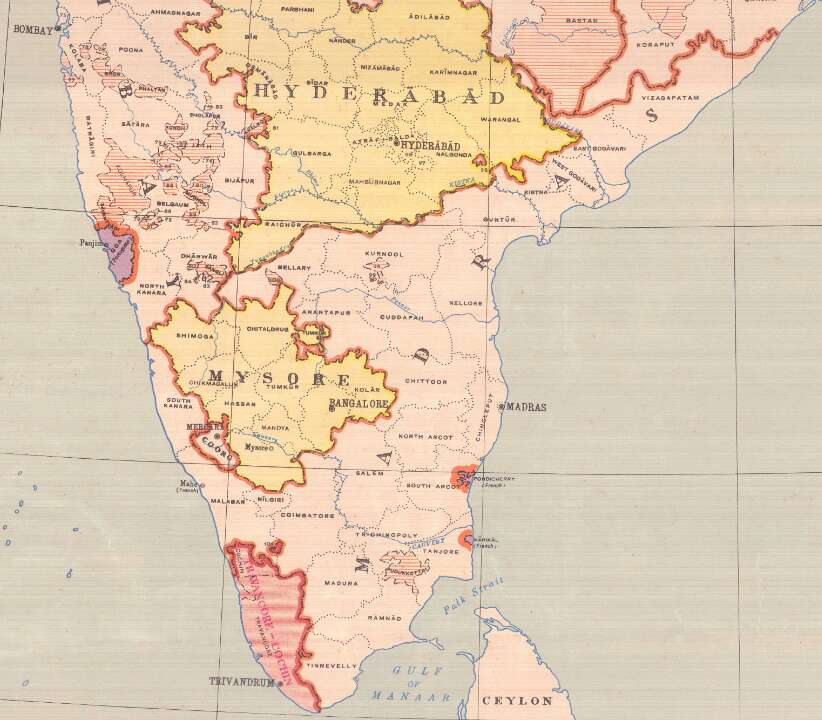Linguistic fault lines
Congress’ departure from its historical stand of organising Madras on linguistic grounds fuelled discontent among Telugu-speaking people

While the first Hindi map of India was celebrated in the Hindi heartland, it met with resistance in the south, especially in the Madras secretariat where, under the influence of Periyar, many of the (non-Brahman) junior functionaries were swayed by his argument that this was a sure sign of 'imposition' of Hindi hegemony by the 'duopoly' of Brahmins and Baniyas to whom the British had 'transferred power' in 1947.
In any case, the lines which defined Madras on the maps of 1950 and 1952 were being fiercely contested by the Telugu-speaking population of the 11 districts (Anantapur, Chittoor, Cuddapah, East and West Godavari, Guntur, Krishna, Kurnool, Nellore, Srikakulam and Vizagapatam). They felt aggrieved that both the Linguistic Provinces Commission (LPC) and the Jawaharlal Nehru, Vallabhbhai Patel and Pattabhi Sitaramayya (JVP) commit-tee had departed from the established policy of the Congress with regards to linguistic states. In fact, as late as 1946, Sitaramayya had been actively engaged in the campaign for the Telugu-speaking state of Andhra and had also extended support to the section of Andhra Mahasabha which had merged with the Hyderabad Congress. When the LPC was appointed, Sitaramayya was the president of the Congress and expectations regarding the formation of Andhra were naturally quite high.
The LPC had been constituted in November 1947, not by the government, but by the Constituent Assembly which appointed the Allahabad High Court Judge SK Dar to head it. The Dar Commission (as it was popularly called) was empowered "not only to enquire into the desirability for creating new provinces, but to also report on fixing their boundaries, and assessing the financial, economic, administrative and other consequences in the provinces of Andhra, Kerala, Karnataka, Maharashtra and the adjoining territories".
However, the commission received representations from all linguistic groups, including those which were not in the provinces mentioned in the 'Terms of Reference'. The report acknowledged the fact that "the formation of linguistic provinces has been an article of faith in the current political thought of the country for the last 30 years and has received the support of the Congress and the blessings of Mahatma Gandhi". With regards to the theory and practice of Congress forming its own units on a linguistic basis (Andhra, Odia, Gujarati, Marathi, Sindhi, Tamil), the report said "freedom has come to us in a way unforeseen and unthought-of, and has set in train the problems and dangers never dreamt of. In view of the dangers which now surround our country, and in the circumstances that now exist, the Congress stands relieved of all its past commitments, and it is its right as also the duty to come to a fresh decision on the subject in the light of the present circumstances".
The committee accepted the fact that the existing provinces were administrative units of British imperialism, not designed to work with democratic institutions, and could do well with more scientific and rational planning. However, "homogeneity of language alone cannot be a decisive factor". Note that even 'the' is not used here. In determining the boundaries of provinces, the emphasis should primarily be on administrative convenience and homogeneity of language will enter into consideration only on this count, and not by its own independent force. In rejecting the demands for the linguistic reorganisation of states, the commission said: "This enquiry has been an eye-opener to us. The work of 60 years of Indian National Congress was standing before us, face to face with centuries-old India of narrow loyalties, petty jealousies, and ignorant prejudices engaged in a mortal conflict; and we are simply horrified to see how thin the ice was on which we were skating".
As such in December of 1948, the commission concluded that "no new provinces should be formed for the present. All things considered, the consideration for linguistic provinces should be postponed for 10 years.
Robert King, in his work 'Nehru and the Language Politics of India', suggested that the report was strongly influenced by Nehru (if not actually written by him). While the report may have given satisfaction to the government, the reaction of those hoping for the reorganisation on linguistic lines, including that of its Congress supporters in Telugu-speaking areas of Madras, was extremely negative. The Congress party had to set up a committee under Nehru himself, the other members being the Deputy PM Vallabhbhai Patel and the Congress President Pattabhi Sitaramayya, on whose insistence the Congress had established the Andhra circle in 1918. The JVP committee was at pains in explaining the non-acceptance of the Andhra demand, for the elven Telugu-speaking districts of Madras fulfilled each of the five criteria — geographical continuity, financial self-sufficiency, administrative convenience, capacity for future development and a large measure of agreement within its borders and amongst the people speaking the same language with regard to its formation — laid down by the commission.
Views expressed are personal



